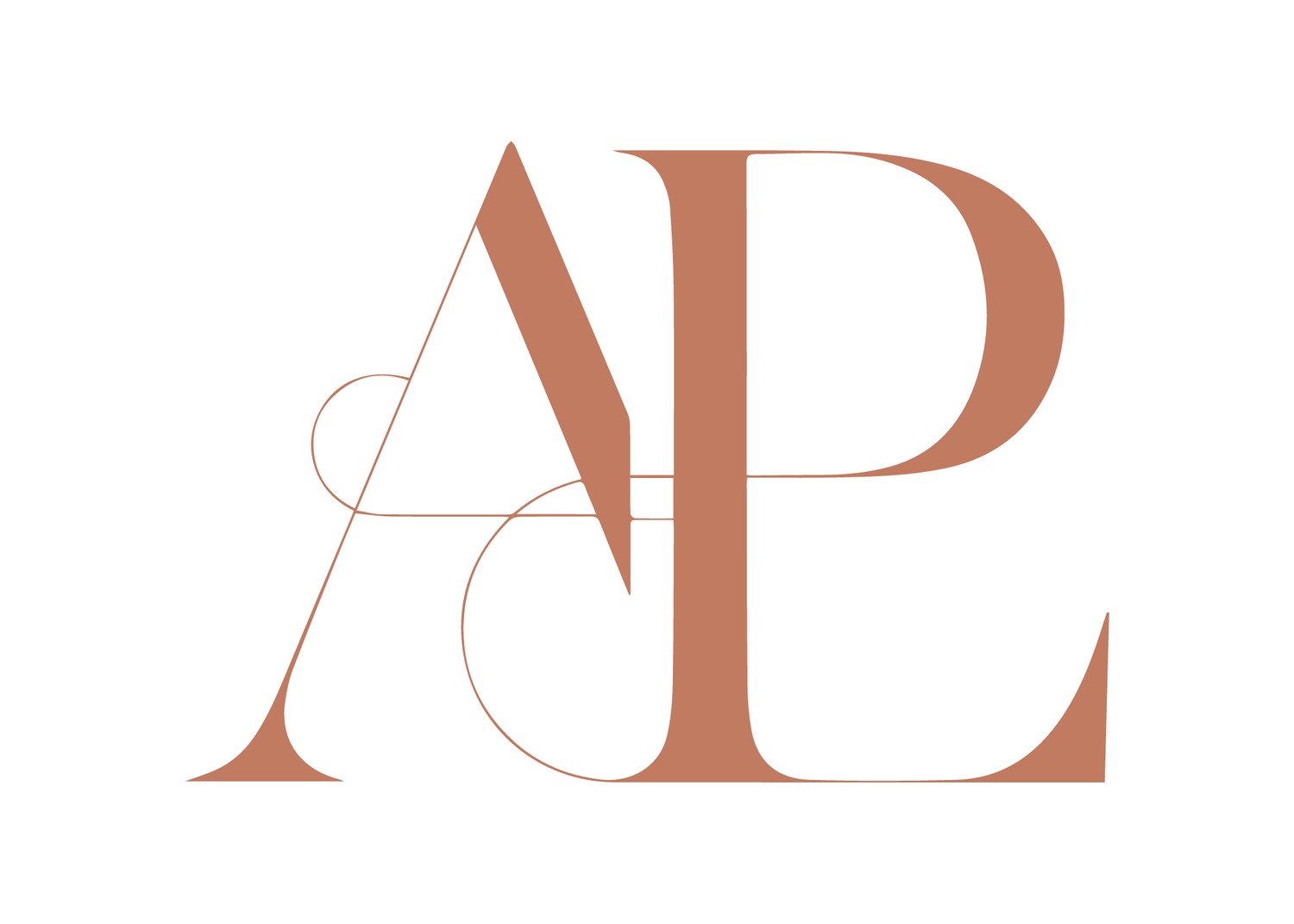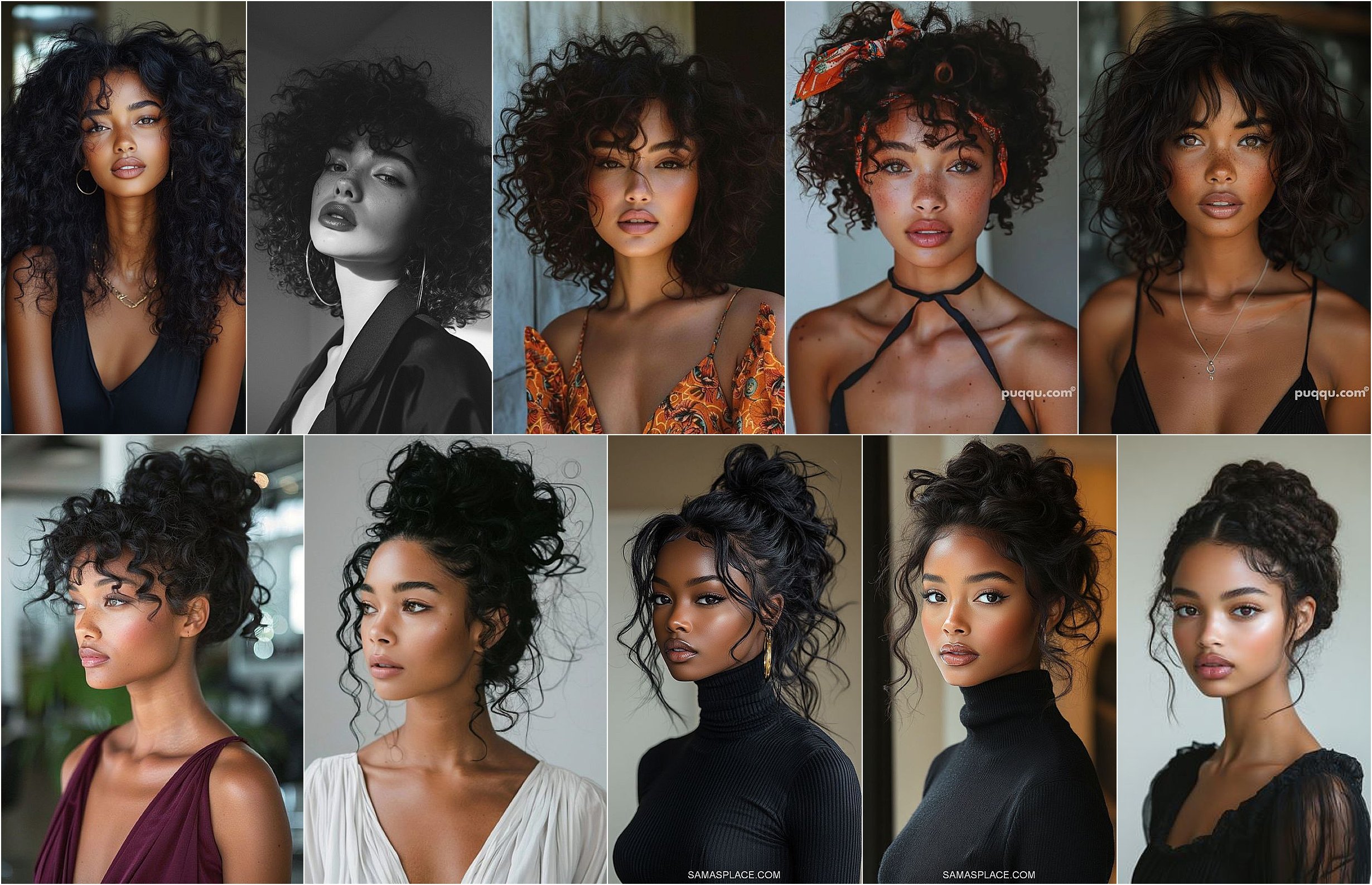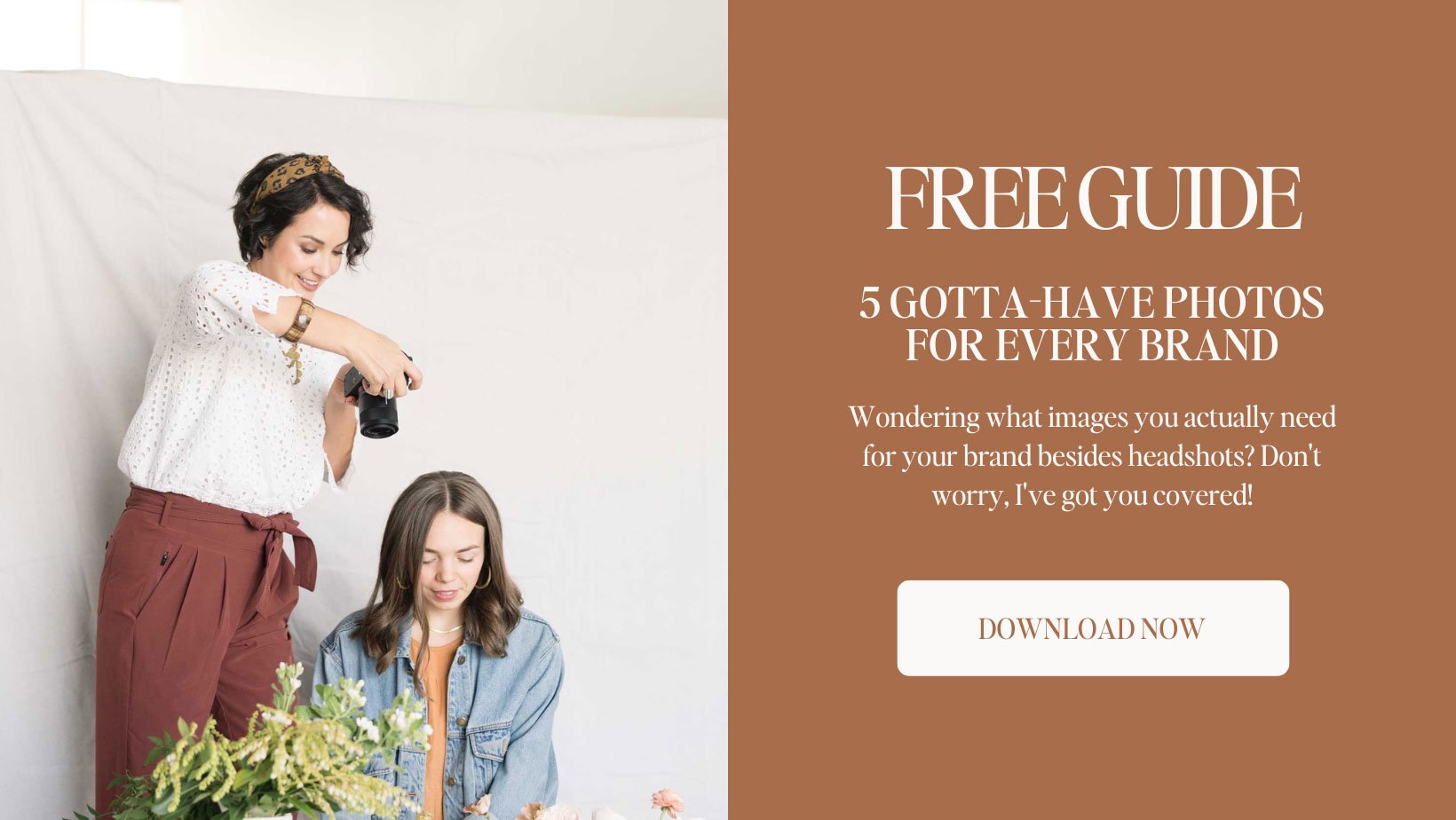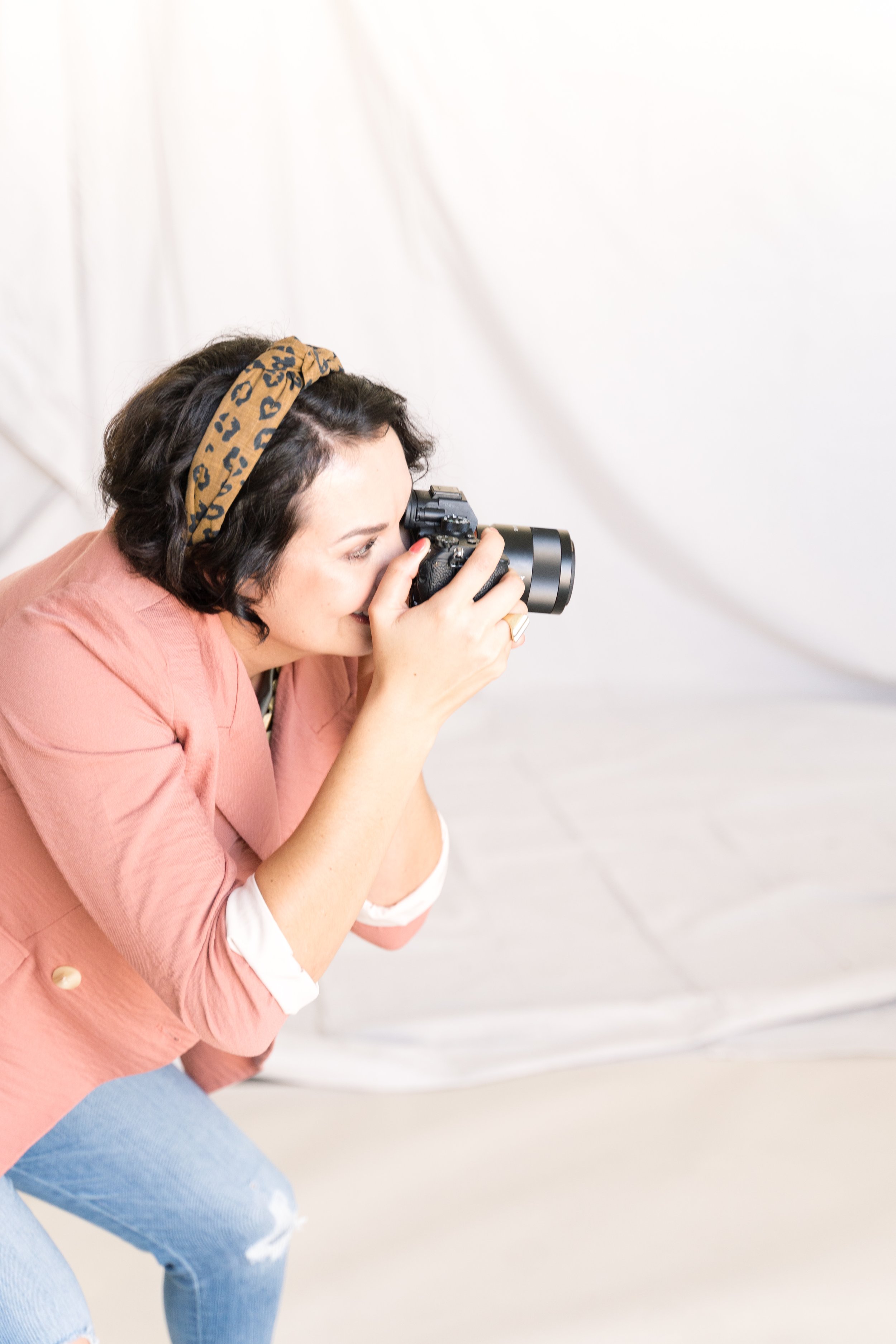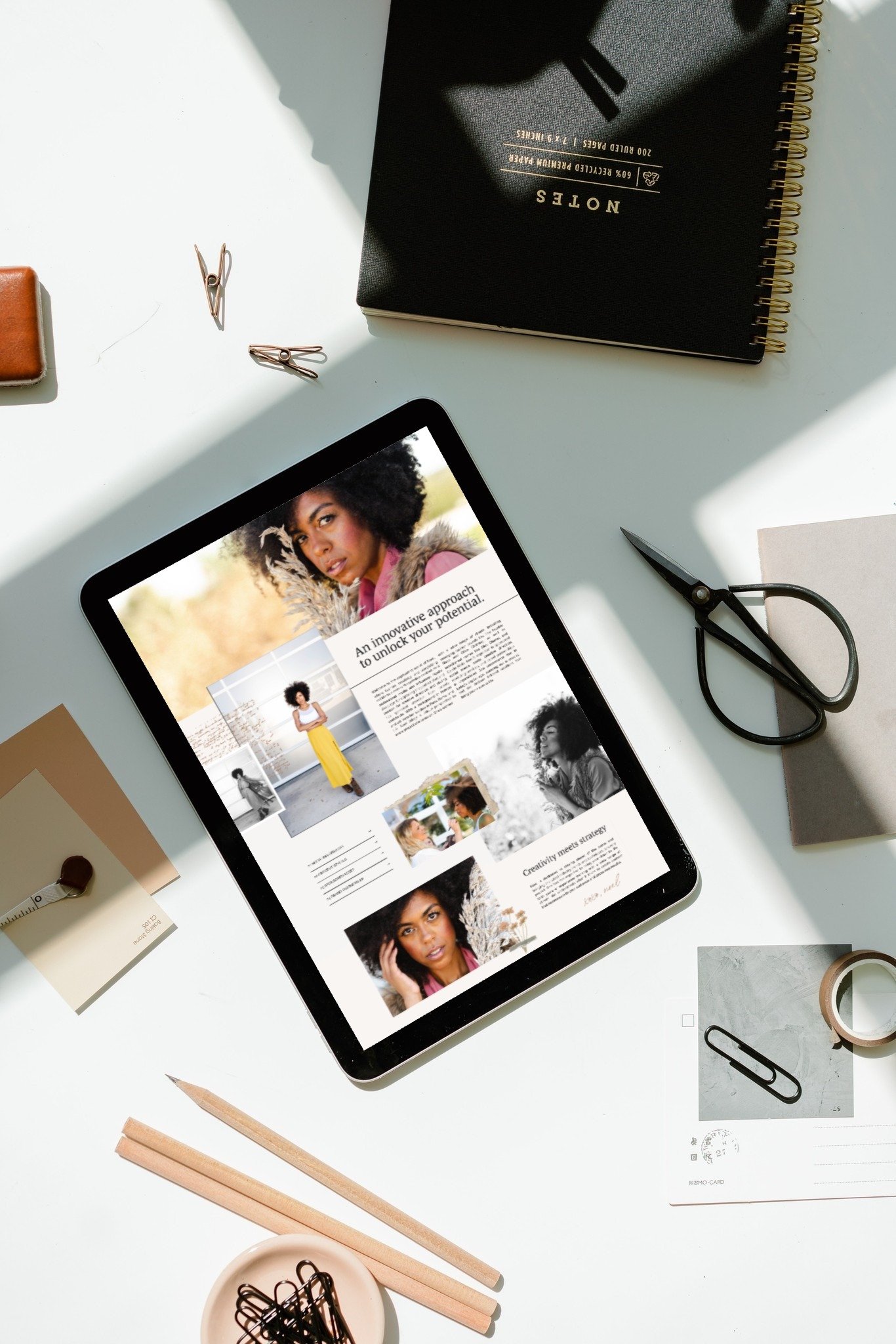We Need To Talk About AI, Pinterest, and Your Brand Photo Inspo Boards
As with every shoot, during my personal branding photo sessions in Austin, TX, clients share their inspirational Pinterest boards with me and their makeup artists. Nothing about this is unusual, of course. We encourage our creative business owners to share their brand ideas, inspirations, and goals for their images with us.
But here more recently, in brand shoot planning or at the start of studio photoshoots, clients have shared Pinterest boards with me where my gut has recognized something as off. You know the feeling… you can’t put your finger on it just yet but you know somethin’ here ain’t quite right.
If you know me, you’ll know I’m nothing if not hyper-focused on details. And sure enough, this is where I stop a client’s scroll, lean in, and go, “Wait, wait..wait a minute…” using my two fingers to zoom in on the phone’s image. As my gut suggests, I find myself disheartened to see client inspiration boards scattered with pin after pin of AI-generated images.
Recently, I spotted another one of these questionable images that sat buried in the columns of pins around it. I decided to have a conversation about this with my client. Ya girl here has some pretty strong ethics (read about them here).
The why that’s in my heart and that’s behind this business drives me, keeps me going, and sometimes refuses to let certain things go. This was one of them. I was preparing to share why I didn’t think she should be using AI images as inspiration, particularly for her hair and makeup look (more on that later in the blog). But to my shock, she had no idea!
My mouth probably dropped open when it occurred to me that this could and would be happening to my clients who run businesses and have all kinds of life smarts and incredible brains!. Maybe, I should have known to address this before now. Ohhhhhh no.
Ah, crap! Do my clients not know about AI images being this prevalent on Pinterest? Would they even know how to spot them!?
If she didn’t catch it, then yes, it was possible. And it was happening.
While being fooled into thinking you can achieve something that exists only in the computer realm is terrible, there’s a bigger problem here, and that is:
My clients are far from alone in this. And I probably only know it myself because I stare at images all day long.
As an empowering story-telling Austin brand photographer I strategize with my clients, I see more and more people unwittingly using AI-generated images as part of their brand photoshoot inspiration.
I am left to inform them that none of it is replicable. No human looks like this.
We shouldn't use these AI-generated pins as a guide or expectation to be met by our photographers, makeup artists, or ourselves.
My hope is that this article will open your eyes to the growing problem, help you identify AI imagery when you stumble across it in the wild, and equip you with the action steps you need to elevate your brand in an AI world.
*** NOTE: This article contains MANY links to Pinterest pins to instruct you on the tell-tale signs of AI.
Advice: Log out of your Pinterest account before clicking on these links. It's better to view these AI examples as a guest user because I’ve found that clicking on an AI-generated pin leads to more of them showing up in your feed.
To make this problem even more frustrating, you often can’t tell something is AI from the thumbnail. Then, once you’ve opened the larger image, the algorithm assumes you're interested and will show you more of it. And if you go down rabbit holes like me, your eyes will cross and you’ll have some residual icky feelings that linger.
It's frustrating, I know! So log out, and then feel free to click away at these examples.
***ANOTHER NOTE & an act of love, if I’m honest :
Because I sincerely care for my amazing Austin brand photography clients, and because I am hyper-focused on sometimes (often) stupid details— I’ve done all the leg work to fully loop you in on this AI Pinterest shit show.
Beyond what I share here in this post, I have curated a VERY detailed Pinterest board to free you from the dark, deep, scary hole I dug myself by pinning crazy AI images. We’re talking over countless hours and many days (my eyes).
This was not. even. by. searching. All I did was one sus image click. Which then marked a breadcrumb trail that truly never ended and subjected me to weird, unimaginable places on Pinterest. So please feel encouraged to head to my link when you’re all done here. Honestly, this could make a great HH with a girlfriend or two. And, WTF Pinterest!?
First, Let’s Look At Pinterest’s Growing AI Problem
If you’re out of the loop or haven’t been on Pinterest lately, you need to know that it has experienced a GIANT uptick in AI imagery and fake Pinterest pins.
Try browsing it for hair and makeup inspo, and chances are high you’ll have a hard time finding a single real human face. If you’re paying attention, you’ll likely ask yourself, “Why does every woman seem to have the same face?!”
Try looking for home reno inspo, and you’ll uncover an unending feed of unrealistic and a little too “perfect-looking” settings (don’t look too close!) Don’t you find these AI images rather boring?
Heck, try typing in pretty much anything, and you’ll find plenty of AI-generated images, many of them stolen from other artists, human faces, and celebrities all mashed together (because that is how AI functions, after all.)
And the kicker is that you’d think the titles might give you a clue. Ha. Think again. The titles of these pins, should there be one, are also deceptive. So, if you weren’t sure if the pin was fake, the title will hook you in and make you think it's real. Here’s an example of what I mean – and another one.
It's bananas. B-a-n-a-n-a-s. 🎵
Some of us can see the difference right now, but I’m scared of where this is going. Everyone should beware. AI is getting better at mimicking, and soon, fewer and fewer people will be able to tell the difference. Computer-generated images will look like the real thing – while not offering a shred of reality. And it sure seems to me that the images using AI won’t even be disclosed.
I worry that, eventually, every photo we encounter online will appear to be of this same unnaturally beautiful woman, tweaked 100,000 times just a *smidge so that each version looks like a new version of the version before. If you head to my Pinterest board, you’ll see exactly what I mean. Somehow, they all look the same, with perfectly smoothed hair and perfect skin – cast under the perfect lighting, so we can be fooled into thinking that the fake, picture-perfect image is real (or if not, better).
Can you imagine a world where those are the only images we see? I think it could be headed straight for us.
Look, the hard truth is I am expecting a huge influx of body image issues and even more unfair expectations to be put on us because of this. Think of the prevalence of self-image problems that already exist. Body dysmorphia. Feeling like you always need to lose weight. Eating Disorders that follow. Lack of self-confidence and trying to be unseen. Puberty becomes even worse because, where’s my glass skin? Discomfort in your skin. Disconnection and Isolation. Self-shaming. Always feeling less than. And then self-sabotage and paralysis because it’s just all too much. AI imagery will likely exacerbate the problem - and this pisses me the f*ck off.
Learning to recognize it, though, is the first step to getting ahead of it.
Tell-tale Signs of AI Imagery (To Help You Spot It Better)
The first step to being able to identify AI is noticing when something feels slightly off about an image – especially if you can’t put your finger on what that something is.
You just know something is off. Usually, it’s proportions, symmetry, textures, or color enhancement,
but also…no one actually looks like that.
Here are the tell-tale signs I want you to watch for.
1. LACK OF TEXTURE
These computer-generated “women” all have perfect, flawless, youthful skin with cheek freckles in every shade of person and – most tellingly – no texture at all. Their skin texture is perfection that doesn't exist. It’s glassy-looking. It’s polished quartz.
*Note: I’ve noticed that AI is already trying to correct this problem. Some of them add a bit more "grit," if you want to call it that.
📌 See my example of a “glassy” texture (poreless, smooth, and totally nonexistent) vs an AI image with subtle texture and lines. They are soft and almost unnoticeable.
GLASSY VS “TEXTURED” SKIN IN AI IMAGES.
The glassy image looks flawless, smooth, and shiny. It mimics polished quartz.
The more textured image shows faint smile lines, subtle lines under the eye, and deeper carved lines along the lips.
*All images in this post have been sourced form Pinterest
These were found as the covers of pins, almost all of them hair and beauty related with titles like, “Silver Color Bob for Seniors”. “Woman over 60” . This one reading, “18 Stylish And Cute Glasses For Women Over 60 To Try Now . Notice they seem to have the same sharp chin, same full lips in a similar half smile, and a sharp nose with glassy skin.
*All images in this post have been sourced from Pinterest
2. SAME AGE
Another thing these AI “people” have in common is that they all come across looking the same age in these images. (Youthful - early 20s), gray hair or not.
For instance, is this person supposed to be old!? Oh, look, there she is again. Wait, and again. Notice how she has perfectly silver hair with no damage at all! Perfect hairline, too. (But check out that last image and zoom in on her teeth. Remember what those look like.).
This is for sure an “older woman” over 60 according to AI. I know because the title of the pin says, “ 34 Elegant Short Haircuts for Women Over 60”. I’m not kidding.
This woman is over 40, apparently. Cause that’s what the pin says!
Here’s an attempt at an "older" woman, and here’s another one. One more for good measure. Are you getting the idea?
3. SAME SHAPES/FEATURES
You may have noticed by now that even older women or women of different races all have the same facial shapes and features. When did everyone start looking like that?! I've never seen anyone look like this in the wild, but yet they all seem to have:
Big, voluptuous, perfectly shaped lips (the kind women pay for)
Either thin, sharp-pointed noses or cute button noses
Flawless, glassy, and untextured skin (they sometimes add grain over the image, making it less crisp and harder to identify as AI)
Hair that is perfectly imperfect - the kind you wish your mama gave you. Thick, full-bodied, wavy, and stunningly highlighted, framing the face just-so (zoom in close to see the smeared strands that give ‘em away)
Thick, bushy eyebrows - the kind almost no one naturally has
Voluptuous, and perfectly shaped lips
Crisp, angled chins and sleek jawlines
The cheekbones we all dream of
Thick, perfect eyelashes
Almond or cat-shaped often exaggerated in color and presentation, or dull & lifeless
lifelessIntensity in the eyes and face – often showing a relaxed expression, melancholy, or sultry-like
Highlights in the perfect spots with stunning lighting
Beautiful, white, perfect teeth or oddly large and misshapen, even beaver-looking teeth (IF they're even showing their teeth– most are not smiling! )
Full, slightly parted lips with just a hint of two large front teeth peeking out that feel off. Zoom in on this one and on this other one here to see what I’m talking about.
Perfectly applied makeup – no variation in application or noticeable drop-offs
Then at some point down the chain, it takes a turn. This unrealistic “flawless” AI person gets cloned and mashed up so many times that her face begins to go off the rails. This once ‘perfect woman’ is then carelessly sent off into the internet void to become the bizarre, twisted, cartoon version of the ‘fake perfect person’ she was curated to be.
And then it’s STILL posted. No quality control, I tell ya.
I mean, MY GOD. Some of these get really ridiculous. <<<< Like ok, her neck is clearly broken and you’re just going to use her to promote “5 creative date night ideas” anyway? The sheer audacity of someone to use AI to make these bullshit images and post them on the internet just to make us feel bad so that they could use it to their advantage and make more sales.
Right now, it’s real people who sit safely behind this all. They throw their AI creations in our faces to sell us on their cheap narrative.
Here’s what I heard in my head as I fell deeper into the rabbit hole,
“It’s too bad you don’t look like this. Buy, buy, buy. It’s money you need to spend so you can look like this AI woman and matter in the world.”
I fell and fell. I fell so far down the damn AI rabbit hole, and yet, I STILL NEVER FOUND THE END.
This AI “woman” featured in the images above NEVER— And I mean, never, ran out of new phony iterations of itself.
Remember, I spent literal days and countless hours (not my best use of time, honestly) studying these patterns to create a complete picture so I could educate you on them.
And did you know? NAME BRANDS ARE DOING THIS AI-IMAGE-STUFFING TO YOU, TOO.
They’re sneakily altering the filter through which you see things in the world (and in the mirror), right under your nose and without you even knowing.
Brands are falsifying themselves to trick frequent shoppers, you, into influencing your buying behaviors so that you will continue to buy.
Ebay, Etsy, & Amazon sellers, Wal-Mart, jewelry stores, hair care & makeup brands, even well-known stores like Gap, Anthropologie, Reformation, Banana Republic, Nordstrom & Free People.
In fact, this AI image is currently being used to sell makeup on the free-people website. Albeit, it’s a rather sloppy one. Is there life in those eyes? Check the teeth. Would exclusive brands like free people or Anthropologie share images where women have imperfect, crooked teeth? Nah, that could damage the desired aesthetics and drag down their brand’s appeal. Did they feel like this was better?
This is clearly an AI-generated image. It’s currently being used to sell clothing on Banana Republic’s website. The jig is up due to the blemished face, strange, elongated arms and torso, and that one weird hand with the weird hand give it away. Notice these signs. View this contorted image and more, currently linked here.
All these big-name, household brands are manipulating images so that they can manipulate you.
You might not have yet noticed. Depending on where you tend to browse, maybe you haven’t come across these fake images yet.
Remember, these AI images are first generated from our real faces without our consent. Brands are using AI to reuse, reduce, and recycle us. Because it keeps their pockets full.
It’s early on in this world’s AI journey, and AI- manipulated images are looking like a cheap, lazy tactic. Already I think to myself —->How boring.
For the love of God, give me real human women with laugh lines, soft chins, big noses, smile lines that sing a song of joy, and leave her wild, tumbling hair out of place. She warms my soul. She can ease pain just by the glance she flickers discreetly to you through her so-alive eyes. Every crinkle and crease and roll and gray hair that won’t be tamed has been earned. Leave our true, beautiful, and oh-so-perfectly-human version of women alone.
From this experiment, my biggest takeawy is this:
Flawless beauty is very clearly flawed.
The only way to fight against AI contorting our self-perception is by embracing our humanness in life — and in photoshoots.
So, are these unrealistic AI beauty ideals leading us down a path where we will scrutinize our appearances even more harshly? Only time will tell, but I’m sure, like me, you too can see where this is going.
Think about your kids and teenage daughters. Imagine how this is going to make aging women and older clients feel. I mean, I know we shouldn't feel bad about getting older – aging is a natural and beautiful part of life, should we be that fortunate – but I know many of us do anyway. Now, with AI imagery, every “old” person looks like a twentysomething with rad grey hair and porcelain skin. Aging is hard enough. We definitely don’t need this ish.
So what can we do?
The best way to combat AI's unsettling influence on self-perception is to actively embrace our humanness in photoshoots and our everyday lives.
When we learn to embrace our imperfections and the unique stories etched on our faces, we send a powerful message to every other woman who came before us and who will come behind us, that beauty is not confined to youthfulness or flawlessness —and that’s good for all of us.
Actions To Take Right Now
It is incredibly frustrating that we are not getting ahead of this problem before it becomes uncontrollable, that “the powers that be” permit this to happen—without any disclaimers.
So – as usual – it’s up to us.
1. Keep a wary eye out for AI images on Pinterest, try to avoid pinning them, notice when they show up on feeds you follow, and mention that they’re AI images when you see friends using them. Most importantly, practice positive self-talk: “These images are not real, BUT I AM. Hell, yeah. I am!”
2. Join us in using Pinterest’s “Request A Feature” form as we collectively ask that they add a function for filtering out AI images. At best, it would be nice for them to let us block it, but, at the least, they could tag such pictures as "AI art” to prevent misleading users. Most of us agree that deceptive practices shouldn’t have a place on any platform.
3. Actively seek out inspo from portfolios of humans (such as ours and this one from one of our makeup artists) instead of performing general searches that may turn up an influx of AI-generated images.
4. Don’t use AI on your professional brand photos to “perfect” them for social media. First of all, this is not allowed by your photographer, but secondly, doing this creates a fake version of you. Inauthenticity is the opposite of good marketing and will do so much more harm to your business than good.
5. Take a page from today’s Pamela Anderson and embrace your realness. You don’t need to make your skin look perfect or take 15 years off your age. As “perfection” becomes more common, it also becomes more boring. Dare to be less perfect and more real.
6. Choose to spend your money with brands & businesses that invest in real images instead of opting to contort women. Well, if you can find one.
The Good News: Authentic Brands Have The Homefield Advantage – Now More Than Ever
AI images were fun at first, but people are quickly getting tired of them. AI-generated content will always lack the human touch, no matter how good it gets.
Dismissing the “human touch advantage” will be a tragic misstep for many brands.
If AI imagery damages big brands' credibility and image, what does it do to your brand when you alter and contort images of yourself? What does it say about a person when they face-tune themselves so their skin is glassy and their brows are full?
Not to even mention, beyond damaging brand credibility and feeling around brand photoshoots, AI damages women and their self-esteem.
The line between what's real and what's not may have blurred online, but people are smart. Every day, more and more of us are getting fed up with the crafted, unattainable perfection that does not reflect the reality we see when we look up from our screens.
And so humans will do what they have always done: look for the glimmers of humanity and authenticity.
And that’s the good news for you and your brand, my friend.
People are tired of perfect. They want real. They want humans. They want to buy from brands that share their values and uniquely human experiences.
As buyers start to actively seek out humanness and imperfection, in the face of the contrary, the value of brands committed to authenticity will skyrocket.
How We Can Help
At Alicia Leigh Photography, our commitment to authenticity in a world of sameness is why I don't use Photoshop.
I believe there are more than enough images out there trying to distort your self-perception. We damn sure aren’t going to add to them.
But, let me tell you, I focus on more than just faces. When we work together, I’ll help you prep for a session that will place you and your brand in an authentic light that resonates with and attracts your ideal customers - freedom seekers.
If you are in or can travel to the Austin, Texas, area, check out my empowering story-driven, results-getting experience to learn more and get started.
If you want to dive deeper into AI education, visit my AI-dedicated Pinterest board. I curated these boards to help you encourage you and give your brand a nudge in the right direction. Are you wondering if you’ll be able to spot AI in the wild? Browse different samples to familiarize yourself so that you'll be able to spot AI in the wild.
And please, keep ‘em off your brand photo inspiration boards.
